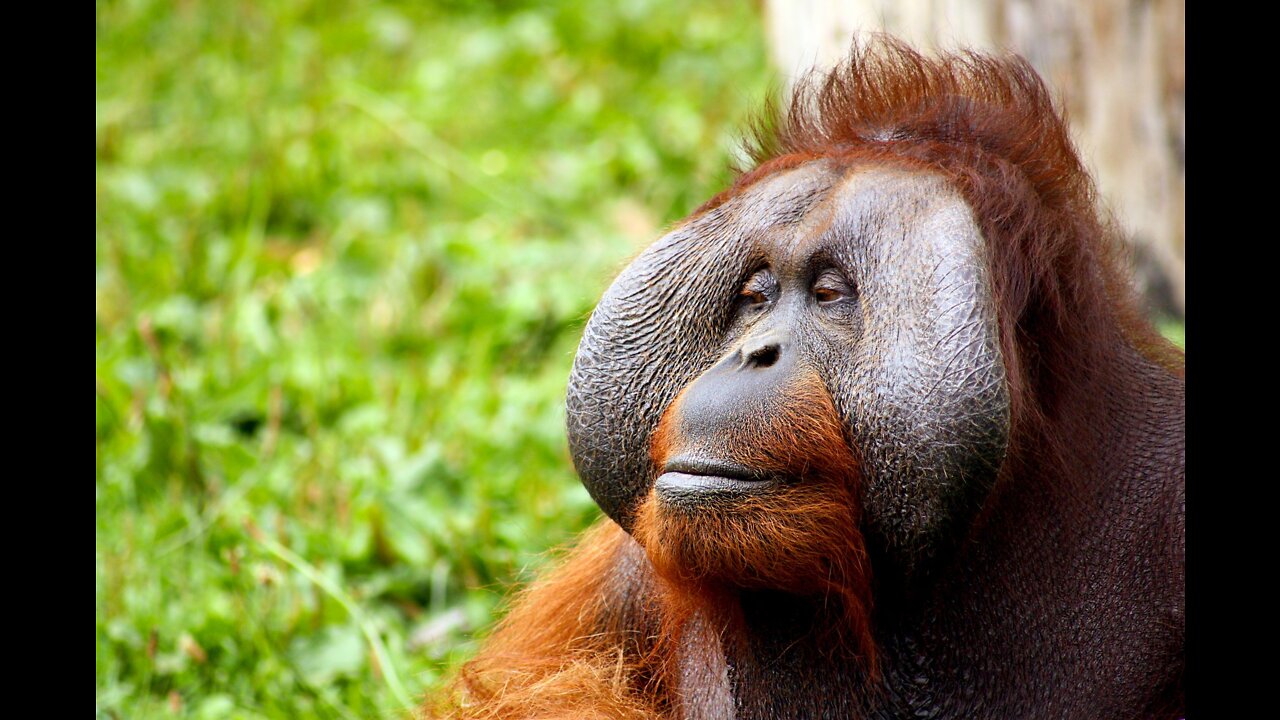Premium Only Content

Orangutan || description, characteristics and facts.
Orangutans (genus Pongo, also spelled orang-utan, orangutang, or orang-utang) are great apes native to Indonesia and Malaysia. They are found in the rainforests of Borneo and Sumatra, but during the Pleistocene they ranged throughout Southeast Asia and South China. Classified in the genus Pongo, orangutans were originally considered to be one species. From 1996, they were divided into two species: the Bornean orangutan (P. pygmaeus, with three subspecies) and the Sumatran orangutan (P. abelii). In 2017, a third species, the Tapanuli orangutan (P. tapanuliensis), was identified. The orangutans are the only surviving species of the subfamily Ponginae, who split from humans, chimpanzees and gorillas 19.3 to 15.7 million years ago (mya).
The most arboreal of the great apes, orangutans spend most of their time in trees. They have proportionally long arms and short legs and their hair is reddish-brown. Adult males may develop distinctive cheek pads or flanges and make long calls that attract females and intimidate rivals; younger males do not and resemble adult females. Orangutans are the most solitary of the great apes, social bonds occurring primarily between mothers and their dependent offspring, who remain together for the first two years. Fruit is the most important component of an orangutan's diet, but they will also eat vegetation, bark, honey, insects and bird eggs. They can live over 30 years both in the wild and in captivity.
Orangutans are among the most intelligent primates. They use a variety of sophisticated tools and construct elaborate sleeping nests each night from branches and foliage. The apes' learning abilities have been studied extensively. There may be distinctive cultures within populations. Orangutans have been featured in literature and art since at least the 18th century, particularly in works which comment on human society. Field studies of the apes were pioneered by primatologist Birutė Galdikas and they have been kept in captive facilities around the world since at least the early 19th century. All three orangutan species are considered critically endangered. Human activities have caused severe declines in populations and ranges. Threats to wild orangutan populations include poaching, habitat destruction because of palm oil cultivation, and the illegal pet trade. Several conservation and rehabilitation organisations are dedicated to the survival of orangutans in the wild.
-
 49:27
49:27
Sarah Westall
1 hour agoTrillion Dollar 5G Lawsuit, Project Archimedes, Mind Control & DEW Weapons w/Attorney Todd Callender
16.7K8 -
 53:11
53:11
Standpoint with Gabe Groisman
1 day agoTrump Is Crucial For Hostage Agreement Says Israeli Colonel
21.5K4 -
 1:01:22
1:01:22
Anthony Pompliano
1 day ago $0.66 earnedTrump Inauguration Sends Bitcoin Flying
16.3K2 -
 15:21
15:21
LFA TV
9 hours agoWHY GOLD WILL CONTINUE TO SKYROCKET
10.8K2 -
 1:31:40
1:31:40
MTNTOUGH Fitness Lab
3 hours agoThe Power of Brotherhood: How Vulnerability and Grit Shape Resilient Men with Thosh Collins
29.9K1 -
 1:45:21
1:45:21
Redacted News
4 hours agoTRUMP JUST SENT PUTIN AN ULTIMATUM ON WAR, ZELENSKY PUSHES FOR U.S. BOOTS ON THE GROUND | Redacted
103K286 -
 1:02:19
1:02:19
In The Litter Box w/ Jewels & Catturd
1 day agoStargate | In the Litter Box w/ Jewels & Catturd – Ep. 725 – 1/22/2025
101K43 -
 1:44:50
1:44:50
The Quartering
7 hours agoJ6 Hostage Release Delayed, ICE Raids Begin, Woke Pastor Vs Trump & Biden's Letter To Trump!
139K86 -
 1:53:02
1:53:02
Space Ice
7 hours agoSpace Ice & Redeye: Sylvester Stallone's Cobra With Critical Drinker
15.5K -
 11:59
11:59
Bearing
11 hours agoCRAZY TikTok Lady's Reaction to Donald Trump's Inauguration 🤣
14.2K36